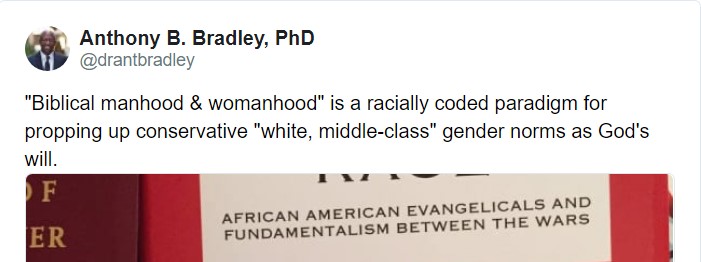
Yesterday, Prof. Michael Bird wrote a short response (“CBMW and the Heresies of ‘Sociology’ and ‘History’“) to my article “Sociology as Theology: The Deconstruction of Power in (Post)Evangelical Scholarship.” If anyone hasn’t read both, I highly recommend they stop and do so now before continuing. Here, I’d like to make a few observations about Prof. Bird’s article that I think are important.
First, Bird’s response mentions only two of the authors I discuss in my article: Kristin Kobes Du Mez and Beth Allison Barr. He says nothing whatsoever about the work of Jemar Tisby, Robert Jones, Andrew Whitehead and Samuel Perry, or Anthea Butler all of whom I also quote at length. His response is also entirely focused on gender, specifically on the complementarian-egalitarian debate, despite my explicit caution that it is a mistake to think that the underlying methodology employed by these books can be limited to a single demographic marker. I wrote:
I worry that pastors will embrace these books thinking that their application can be confined to, say, race alone. But once a white pastor endorses the view that he — as a white male — is blinded by his own white supremacy, unable to properly understand relevant biblical principles due to his social location, and in need of the “lived experience” of oppressed minorities to guide him, how long before someone in his congregation applies the same reasoning to his beliefs about gender? Or sexuality?
Second, Bird gently chides me for not being more open to the insights of sociologists and historians. He writes:
Rather than circle the wagons against the barbarian hordes of historians and sociologists who are exposing your dirty laundry and digging up the dead bodies behind your house, maybe consider that there is something to learn here.
But, again, I explicitly addressed this concern. The very first application point of my article was
we should concede criticism whenever it is valid. No doubt, conservative Christians helped to prop up (and dismantle) slavery. Some conservative Christians today are insensitive, at best, when it comes to racial issues. The downfall of celebrity pastors and cover-ups of sexual abuse are appalling. Complementarian churches are not always places where women are valued, honored, and equipped for ministry. To deny these truths is not only to ignore reality, but to further convince people that the only way to take racism and sexism seriously is to embrace unbiblical ideologies.
Third, Bird never interacts with my main argument, which is the claim that any approach to theology that “sees through” the arguments of evangelicals as mere bids to protect white, male, Christian hegemonic power is necessarily a universal acid which will eat through every doctrine to which it is applied. Bird’s appeal to a Tweet from Anthony Bradly exemplifies my concern.

Bird writes:
I find myself returning time and again to this tweet by Anthony Bradley of The King’s College….I invite anyone from CBWM [sic] to disprove that tweet. History and social location have undoubtedly shaped organizations like CBWM [sic]. CBMW is a product and purveyor of a specific culture, in a specific place, with a specific set of values.
I’m immediately left wondering what, exactly, is keeping someone from slipping “heterosexist, cisnormative” in between “white” and “middle-class” and then using precisely the same reasoning to dismiss Prof. Bird’s own stance on sexuality or gender identity as a “product… of a specific culture, in a specific place, with a specific set of values.”
Lest anyone argue that no one is making such a leap from gender to sexuality, I’d remind them that Bird himself recently facilitated a discussion (entitled “Burning the Patriarchy”) between Du Mez, Barr, and David Gushee, an evangelical ethicist who recently became LGBTQ affirming. I’d also point them to this thread from pastor Thomas Horrocks who said “This is why they’re deathly afraid of CRT. It exposes the logic of oppression, and before long you begin to understand that discrimination has [sic] on the basis of race is built on the same logic as discrimination against women and LGBTQ people.”
If Bird counters that his beliefs, unlike those of CBMW, are not merely the product of his culture, but are actually rooted in Scripture, I’d merely point out that the people at CBMW would say exactly the same thing. Once you give credence to the idea that you can simply assume without argument that a person’s views are false and then spend your time explaining how their views are merely the product of their biases, cultural prejudices, hidden motivations, political agenda, etc. it’s only a matter of time before someone applies the very same reasoning to your views.
Fourth, Bird criticizes my article for
reiterating the same thing Jonathan Leeman complained about, namely, du Mez and Barr and others are doing history and sociology, but we do Bible. They are postmodern deconstructors, we are biblical exegetes! Alas, t’was it t’were so simple!
But, again, that is not my argument. I noted in my article that:
What is notably absent from almost all these books is any attempt to defend or square their claims with the Bible or with historic Christian theology.
My concern is not that they are sociologists while we are theologians but that they are reaching theological conclusions via sociology alone. All these books are smuggling normative theological “ought” statements into their discussion of positive sociological “is” statements. As an illustration, it might be factually true that Christians did use theological claims about the divinity of Jesus or the exclusivity of Christianity to persecute Arians or to justify colonialism. But does it follow that we ought to reject the divinity of Jesus or the exclusivity of Christianity? Of course not. These normative theological claims have to be made and defended on the basis of theology, not on the basis of history or sociology alone.
Finally, few people seem to realize that this entire line of reasoning can be turned around. For example, in his 2012 book Bourgeois Babes, Bossy Wives, and Bobby Haircuts, Bird apparently affirmed that male headship is “normative” and “indisputable.” Yet on Twitter, he acknowledged that he has now “changed his mind” and believes that “headship is culturally functional in certain places, but not necessary.” So whose belief is correct? Bird circa 2012? Or Bird circa 2021? Was Bird-2012’s interpretation of the Bible a mere product of cultural prejudices? Or has Bird-2021 succumbed to an academic environment that is increasingly hostile towards complementarianism? And couldn’t I write an entire book “proving” either conclusion: either that Bird-2012 was blinded by his commitment to patriarchal power or that Bird-2021 is blinded by his fealty to progressive mores?
This game of Bulverism can be played ad infinitum, but it is at once terribly dull and incredibly dangerous. We simply cannot (as in, it is an actual logical fallacy that will undermine reason itself) countenance the idea that a claim can be dismissed as false by attributing particular motives to the person making the claim. Affirming this basic, logical truth does not depend on you being a complementarian, a Calvinist, an evangelical, or even a Christian. As such, I’d hope it’s something we can all agree on.
Related articles:
- Sociology as Theology: The Deconstruction of Power in (Post)evangelical Scholarship (external)
- CBMW and the Heresies of ‘Sociology’ and ‘History’ (external)
- Unmaking the Patriarchy: A Brief Review of Barr’s Making of Biblical Womanhood
- Cowboy Christianity: A Short Review of Du Mez’s Jesus and John Wayne
- God and Country: A Short Review of Whitehead’s and Perry’s Taking America Back for God
- A House Divided: A Review of Tisby’s How To Fight Racism
- Compromised? A Long Review of Tisby’s Color of Compromise
- Religion as Racial Politics: A Short Review of Butler’s White Evangelical Racism